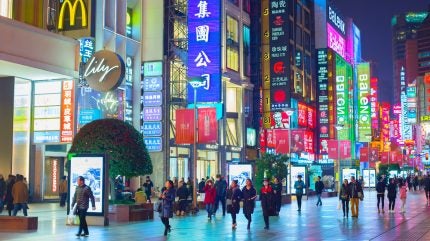
China has announced a reduction in the minimum spending required for foreign tourists to qualify for tax refunds, aiming to boost domestic consumption amid economic challenges.
Effective from April 26, 2025, visitors can now claim a tax refund on purchases of 200 yuan (approximately £23) made at the same store on the same day, down from the previous threshold of 500 yuan (about £58).

Discover B2B Marketing That Performs
Combine business intelligence and editorial excellence to reach engaged professionals across 36 leading media platforms.
The maximum cash rebate has also been increased to 20,000 yuan (around £2,300). This move is part of China’s broader strategy to enhance the appeal of its retail sector and attract more international shoppers.
Expanded access and streamlined procedures
In addition to lowering the spending threshold, the Chinese government plans to expand the number of eligible tax-refund stores, particularly in high-traffic areas such as shopping districts, scenic spots, airports, and hotels.
This expansion aims to make the refund process more accessible and convenient for tourists.
Authorities are also promoting the establishment of immediate rebate points in tourist-heavy regions, allowing visitors to receive refunds on the spot.

US Tariffs are shifting - will you react or anticipate?
Don’t let policy changes catch you off guard. Stay proactive with real-time data and expert analysis.
By GlobalDataEconomic context and strategic objectives
This policy adjustment comes as China faces economic pressures, including a trade war with the United States. In 2024, spending by inbound tourists reached $94.2 billion, marking a 77.8% increase from the previous year.
However, this still accounted for only 0.5% of China’s GDP, compared to 1% to 3% in other major economies, indicating significant untapped potential.
By stimulating foreign tourist spending, China aims to offset some of the economic challenges posed by escalating tariffs and trade restrictions.
Implications for the retail sector
The reduction in the tax refund threshold is expected to have a positive impact on China’s retail sector.
By making it easier for foreign tourists to claim refunds, the policy is likely to encourage increased spending, particularly in high-end retail and luxury goods.
The expansion of eligible tax-refund stores and the introduction of immediate rebate points are also anticipated to enhance the shopping experience for international visitors, potentially boosting foot traffic and sales in participating locations.
This initiative reflects China’s ongoing efforts to adapt its retail strategies to the evolving global economic landscape, aiming to attract more international shoppers and stimulate domestic consumption.





